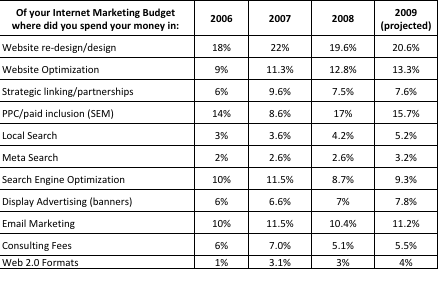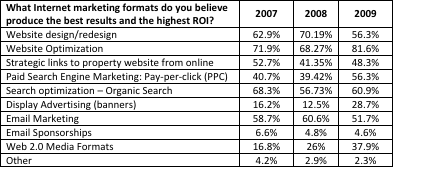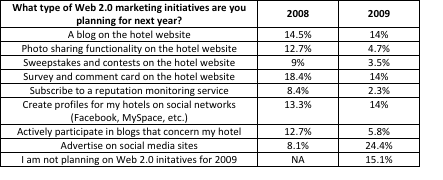In the tough year that 2009 is turning out to be for hoteliers, it is crucial to know where every marketing dollar is being spent. When reevaluating marketing plans – as most of you have had to do this year – hoteliers also need to consider whether or not they should shift marketing dollars from offline to the more measurable online initiatives, what their peers are doing, and how they can evolve with the industry without wasting valuable dollars on unproven tactics. How are hoteliers budgeting for their Internet marketing this year? Are they focusing on Web 2.0/Social Media initiatives in this recession? What percentage of business should be coming from your website?
In the 3rd Benchmark Survey on Hotel Internet Marketing Budget Planning and Best Practices in Hospitality, HeBS set out to answer these questions and identify trends in online marketing in hospitality. The purpose of the survey was to assess hoteliers’ 2009 Internet marketing priorities and strategies in order to compare with the responses received last year, and to provide the industry with insights on how internet marketing strategies for the hospitality industry are developing.
Who Participated in this Survey?
The survey experienced global participation, with almost half of respondents from the US and Western Europe. Hospitality executives included general managers (20.6%), sales and marketing directors (49.6%), e-commerce managers (13%), and revenue managers (29.8%).
The full spectrum of hospitality and travel verticals are represented in this survey, including boutique hotels, upscale hotels, budget, mid-scale and luxury franchised properties, major brands, real estate groups, resorts, hotel management companies, casinos, and more. Most participants were hoteliers from independent properties, however there was a heavy influence this year of franchise/hotel brand hoteliers.
Main Findings from the 3rd Benchmark Survey
- Hoteliers strongly believe that Internet marketing produces the best results. We asked hoteliers whether they thought Internet marketing, traditional marketing, or a mix of both produces better results and 55.7% said Internet marketing (up from 49.2% in the 08 survey and 37.7% in the 07 survey). Hoteliers are right on target as the online channel will be the only growth channel in hospitality in 2009-2010.
- Even in this current economic environment, 63% plan to increase their Internet marketing budget in 09 – and a majority of hoteliers are planning on raising their online budget more than 15%. A larger percentage of respondents this year (33%) will be keeping their 09 budget at 08 levels. Where is the money coming from for hoteliers that are increasing their Internet marketing budget? Fifty-three percent of respondents are shifting money from offline marketing budgets.
- In the 2009 survey, we introduced ‘the economic environment’ as one of the multiple choice options when we asked hoteliers what factors they will consider in planning their 2009 budget. Not surprisingly, 81.6% of respondents said that the economy will affect their budget planning for 09. We also saw that ‘what my peers are doing’ and ‘industry averages’ had less of an influence on hotel budget planning this year.
- The types of Web 2.0 marketing initiatives planned for 09 vary greatly from 07 and 08. In previous years, hoteliers selected Surveys and Comment cards as the Web 2.0 initiatives they were planning. This year, hoteliers selected advertising on Social Media sites (i.e. TripAdvisor), creating profiles on social networks and a blog on the hotel website.
- Almost half of all respondents believe their property does NOT conform to industry’s best practices in terms of Internet marketing. While hoteliers are getting more educated about the direct online channel, many of them do not have the internal resources, bandwidth or knowledge to deal effectively with this highly dynamic field.
- This year, hoteliers overwhelmingly responded that they thought website optimization produced the best results and the highest ROIs (81.6%). Search optimization – organic search was next at 60.9%. Indeed, both website and search optimizations are the most-cost effective initiatives for hoteliers in this economy.
- This year, 85.6% of franchise/major brand hoteliers respondents said they did not find there to be major restrictions in online marketing due to brand restrictions. This percentage is increasing over the years (81.8% in 2008 and 76.2% in 2006) as more and more franchisees embrace best practices and launch local Internet marketing initiatives that complement their brand efforts.
- The percentage of hoteliers who are participating in Paid Search increased from 50% in 2008 to 59.8% in 2009. The use of Meta search and local search is also increasing year after year. Also, Web 2.0 Paid Search (e.g. TripAdvisor) was big this year as 32% of respondents are spending marketing dollars on this initiative. These responses are in par with industry practices and show that hoteliers are aware that as much as 60%-80% of traffic and bookings on hotel websites originate from the search engines.
Where is Hotel Business coming from?
For the past three years, Benchmark Survey respondents have said that most of their business comes from the direct online channel, which is supported by industry data. In 2009, more than 55% of all travel bookings and up to 40% of all hotel bookings in North America will be generated from the Internet (eMarketer, HeBS), which represents a double-digit growth over 2008. At least another third of hotel bookings will be directly influenced by online research, but booked offline. Over 65% of online hotel bookings will come from the direct online channel (76% for the major hotel brands).
However, 2009 survey results also show that bookings made via Online Travel Agencies (OTAs) have increased for hoteliers – from 19% in 08 to 21% in 09. This is in large part due to the dire economic situation many hoteliers are going through. Hoteliers seem to be worried about lower occupancy rates and are providing more and more inventory to the OTAs. What hoteliers are not realizing however is that the OTAs are also affected by the overall decline in travel demand (Expedia reported 7% decline in revenue in Q4 2008) and can help only so much. Therefore the only real growth channel in 2009-2010 is the direct online channel which allows savvy hoteliers to outsmart the competition and gain market share.
Budgeting for Hotel Internet Marketing in a Recession
Compared to last year’s survey, we noticed an increase in hoteliers saying that they have overall budget constraints. Hoteliers are less concerned with what peers are doing now then they were last year (24% in 2006 up to 27% in 2007, and back down to 18% in 2008), and much more concerned with the economy. We saw the same decrease with concerns over industry averages for budget planning (from approx. 40% over the last two years, to 30%). However, despite the economy, most hoteliers are increasing their Internet marketing budgets in 09:
Table A

So where is this increase coming from? As expected, over half of the respondents (53%) said they were shifting money from the offline marketing budget.
When asked approximately what percentage of your overall marketing budget was devoted to Internet marketing activities in the past year, most respondents were in the 11-20% and 21-49% range. More people are devoting a larger portion of their overall budget to Internet than they had been in 06 and 07. Year after year we are seeing a shift from lower categories of percentages to higher percentages of money spent on the Internet, although hoteliers are still using traditional media. In this year’s survey results, people that were throwing their entire budget towards the Internet (76-100%), have scaled back as hoteliers discover a better balance between traditional and Internet marketing budgeting.
Once the budget is set, what are hoteliers spending their Internet marketing dollars on? From the table below, you can see that they are indeed spending their money on those formats they believe achieve the highest ROIs. Website design, website optimization, paid search and email marketing consume fairly high percentages of the budget (Table C), and this correlates with those activities hoteliers see as producing the highest returns (Table D).
Table B

What Marketing Formats do Hoteliers Believe Produce the Best Results?
What are the Internet marketing formats hoteliers believe generate the highest ROIs?
In the 2007 and 2008 results, website design, website optimization and search engine optimization ranked as the highest revenue generators. For 2009 we saw a decrease in the percentage of people who ranked website design as one of the highest revenue generators.
This thinking is in line with current budget restraints due to the recession. Website optimizations are much more affordable than website redesigns, and often pay for themselves within 3-4 months (as do website redesigns). Unless the website is over 2-3 years old, hotel optimizations can help hoteliers take advantage of the much cheaper organic search related visitors to the hotel website.
Table C

Even though hoteliers are going back to the basics this year, there are a high percentage of hoteliers who believe Web 2.0 initiatives produce results. This is interesting considering that according to Table E below, 15% of respondents are not even planning Web 2.0 initiatives for 2009.
The results make a lot of sense however, in the case of the increase of hoteliers who thought Paid Search Marketing produces the highest ROI. We saw the use of paid search decrease from 07-08, and then saw over a 40% increase in the 09 survey results. This is most likely because more and more hoteliers realize that Paid Search works. According to eMarketer, these survey results are on track for search engine marketing across all industries (not just hospitality), as U.S. spending on search engine marketing will nearly double from $12.2 billion in 2008 to $23.4 billion in 2013.
Brand Standards & Regulations on Hoteliers are Easing Up
For the past two years in the HeBS Benchmark Survey, franchised hotels have responded that they feel there are some major restrictions on their online marketing efforts. However, this percentage has been decreasing year over year:
Table D

Here are some of this year’s responses:
• ‘Email marketing is a challenge when past guest lists are under brand control.’
• ‘You can’t be as flexible as you need, you don’t spend a lot of money in online marketing because you can’t analyze it as you would [normally] do.’
• ‘Hotel website is stand-alone however we have to use the Franchise Booking Engine.’
• ‘Limitations of who you can contract with.’
• ‘Restriction for hotel pictures loading…restriction for hotel package design and loading.’
So what does this tell us? HeBS believes that there are many online revenue opportunities which fall outside the scope and ‘bandwidth’ of the major hotel brands’ Internet marketing efforts. Even though most of the leading hotel brands have become proficient national and international eMarketers over the past 5-6 years, they cannot possibly cover all the local online revenue opportunities available to the property. As hoteliers are becoming more Internet marketing savvy, they are realizing they can complement the hotel brand’s Internet marketing efforts with their own ‘Local Internet Marketing Strategy for Franchised Hotels’ – read HeBS’ article on the subject.
What’s Ahead for Hoteliers and Social Media?
Social media continues to be a hot topic in the industry, and more hoteliers are looking for the next big thing they can do (without spending a lot of marketing dollars). We asked hoteliers what type of web 2.0 initiatives they were planning for 2009 and compared it to 2008 results:
Table E

According to the survey, this year the most important Web 2.0 initiatives were: advertising on social media sites (25%), a blog on the hotel website (14%), creating profiles on social networks (14%) and survey and comment cards on the hotel website (14% – although this is significantly down from last year). Last year, hoteliers selected Surveys and Comments Cards as the most popular option. Another big drop was in the use of reputation monitoring tools, as hoteliers become savvier and realize they can monitor the most popular sites that offer reviews themselves – and for free – read HeBS’ article on the subject.
Conclusions
The survey results show that hoteliers really are ‘Getting Back to the Basics’ in this tough economy – read HeBS’ article on the subject. While there were some interesting results, such as an increase in hoteliers planning on advertising on social media sites, hoteliers are shifting budgets from offline to online, focusing on Internet marketing initiatives that have been proven, are becoming savvier at monitoring their hotel reviews on their own, and in general are embracing the Internet as their most cost-effective, revenue generating tool.
All industry forecasts indicate that in 2009-2010 the travel industry in North America will experience a major decline. GDS contribution is also projected to decrease by several percentage points. And yet, online travel bookings in 2009 are expected to grow by 10.5% and reach $116.1 billion due to channel shift, and an additional 11% in 2010 to reach $128.9 billion (eMarketer).
In other words, this year the Online Travel Channel will be the only growth channel in hospitality and, as the survey shows, many hoteliers clearly understand that. Here at HeBS, we firmly believe that a comprehensive, ROI-centric Internet marketing strategy is one of the perfect ‘survival tools’ for hoteliers in the current economic environment. The direct online channel can help smart hoteliers generate incremental revenues, improve marketing ROIs, attract more affluent travelers and out-smart the competition. For the past 14 years, our experience shows that Internet-savvy hoteliers with robust Direct Online Channel strategies are the winners in economic downturns like this one.
About the Authors:
The HeBS team for this project consisted of Max Starkov, Jason Price, Mariana Mechoso and Evan Rosenblum.
About HeBS:
Hospitality eBusiness Strategies, Inc. (HeBS) is the industry’s leading Internet marketing services and strategy consulting firm for the hospitality and travel verticals. As a full-service Internet marketing and strategic consultation services firm, HeBS has pioneered many of the “best practices” in hotel Internet marketing and direct online distribution. HeBS specializes in helping hoteliers boost their hotel Internet marketing presence, establish interactive relationships with their customers, and significantly increase direct online bookings and ROIs.
A diverse client portfolio of over 500 top tier major hotel brands, luxury hotel and resort brands, golf and spa resorts, hotel management companies, franchisees and independents, meeting and conference venues and CVBs has sought and successfully taken advantage of HeBS’ hotel and travel Internet marketing expertise.




